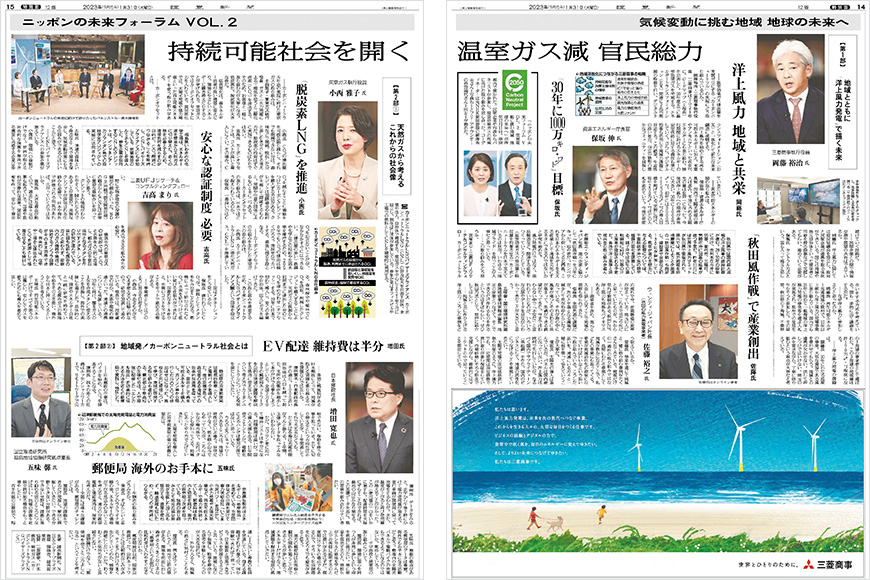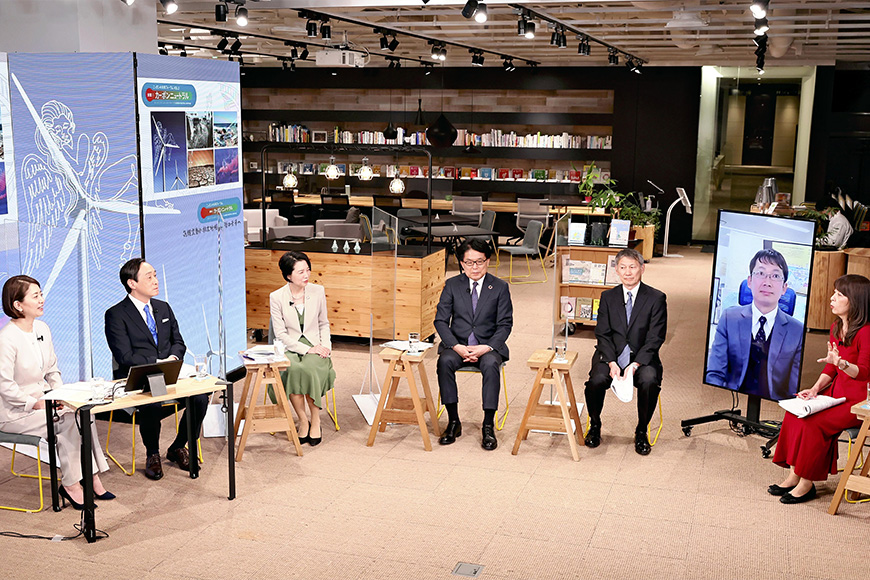Decarbonization Project

The Yomiuri Shimbun is engaged in the Decarbonization Project to promote measures to combat climate change.
We are mainly focusing on the following three areas: 1) reducing greenhouse gas emissions, 2) forest preservation, recycling, and utilization of new technology, 3) decarbonization through reporting and business activities. The following introduces our initiatives.
Environmental Policy, Decarbonization Action Plan
Basic principles
Passing down a better environment to the next generation is the most important duty of all of humanity. The Yomiuri Shimbun Holdings, Tokyo headquarters, Osaka headquarters and Seibu headquarters have actively engaged in this challenge as a news organization through our reporting and other activities. We intend to continue actively doing so. To reduce environmental impacts of our editing, production and sales activities at our three headquarters, we will continue to conduct environmental protection activities and take climate change measures as an organization and contribute to realizing a decarbonized society, and sustainable global environment.
Basic policy
- We establish an Environmental Committee within the company to constantly upgrade environmental measures and promote activities.
- We establish and pursue goals for reducing the impact of our business activities on the environment and constantly improve the situation while reviewing the progress.
- Among the environmental impacts related to our business activities, we define the following items as our focused areas for environmental management, set objectives and targets, and take necessary steps.
- Reduce greenhouse gas emissions by reducing fuel burning and electricity consumption.
- Reduce office paper use
- Appropriately sort and recycle wastes
- Publish articles and advertisements that help promote environmental measures and related technological innovations and hold and support related events
- Offset greenhouse gas emissions through forestation activities, etc.
- We comply with environmental laws and regulations and other requirements related to our business activities
- We make this environmental policy known to all employees and people working in the Yomiuri Shimbun Group and also publish it for the general public so that each individual actively practices initiatives aimed at decarbonization.
The Yomiuri Shimbun Holdings, The Yomiuri Shimbun, The Yomiuri Shimbun, Osaka, The Yomiuri Shimbun, Seibu
(Revised April 1, 2023)
The Administration Department in the Administration Bureau will take charge of the Environmental Committee, which promotes environmental activities within the company, and the committee's secretariat is in this department. The committee chairman is the head of the Administration Bureau, who is one of the company's executives. Investment plans necessary for executing climate change measures are devised mainly by bureaus and departments in charge of administering plants and buildings. Initiatives for realizing decarbonization are incorporates into our management plans and steadily carried out.
Energy-saving measures
The Yomiuri Shimbun encourages saving electricity at its Tokyo, Osaka and Seibu headquarters, branch offices, regional bureaus and regional reporters' offices, while at printing plants, we are steadily upgrading rotary presses to the latest energy efficient models as we continue taking steps to reduce energy use. Based on the Law on the Rational Use of Energy (Energy Savings Law), we report to the government the specific energy consumption (SEC), which is calculated by dividing the energy consumption used for production by the actual production volume, making improvements of at least 1% compared to the previous year (99% or less of the previous year), the target for efforts required by law. In fiscal 2022, we achieved a year-on-year improvement of 2 percent, which is also a 29.7% improvement compared to fiscal 2013.
*The specific energy consumption (SEC) is an indicator of energy efficiency. Energy used in corporate activities, including electricity, gas, coolants, steam, and fuel oil, are converted to the petroleum equivalent and divided by the total floor area of all buildings at sites where business activities take place.
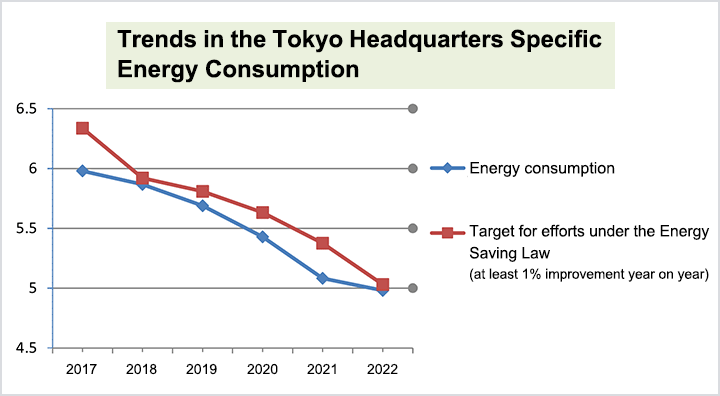
We participate in the Zero Emission Tokyo environmental program of the Tokyo Metropolitan Government that aims at net-zero CO2 emissions, and the Yomiuri Shimbun Tokyo Headquarters in January 2021 was awarded a letter of appreciation from the Tokyo governor. The Tokyo headquarters, through the Tokyo Metropolitan Government's cap and trade program, which requires CO2 reductions at office buildings and factories within the Tokyo metropolitan area, reduced emissions far exceeding the amount required and provided the Tokyo government with an emissions allowance of 32,151 tons, an amount beyond the standard. This emissions allowance contributed to reducing Tokyo's emissions by offsetting CO2 emissions increases elsewhere.
External activities
In the spring of 2023, we began participating in the GX League, a voluntary group of private-sector companies aimed at reducing greenhouse gas emissions. It was established by the Economy, Trade and Industry Ministry. We will set specific emissions targets and announce our achievements. We are also a supporting member of Japan Climate Leaders' Partnership (JCLP), a corporate group working to realize a sustainable, carbon-free society, becoming the first media company to become a member in 2021. Through regular participation in forums and research seminars held by these public groups, we will deepen our knowledge related to decarbonization, which will make our measures more effective.
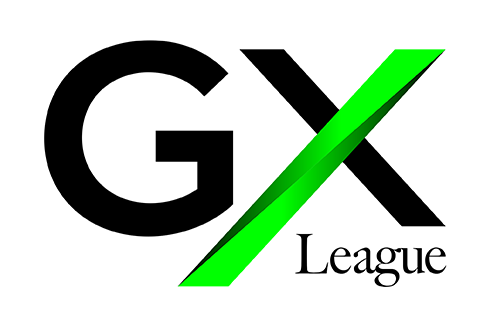
Newspaper Recycling and Forest-Planting Activities (Yomiuri no Mori)
Recycling of used newspapers is essential to stably securing materials for newspapers while protecting forest resources. In 1972, a Yomiuri Shimbun sales outlet began collecting used newspapers at the request of readers. Thereafter, the Yomiuri Recycle Network (YRN), made up of The Yomiuri Shimbun's Tokyo headquarters, Yomiuri Shimbun sales outlets and newspaper recyclers, has promoting the initiative of collecting old newspapears with the support of our readers and build a recycling system.
Today, on average, 70% of Yomiuri Shimbun newspapers are made from waste paper pulp, with the newspaper industry being called an excellent model of recycling.
Closed loop
In April 2020, we also launched a closed loop system (Yomiuri eco-sharing) that recycles 100% of the resources domestically. Under the system, we sell old newspapers collected from our readers' households in Tokyo directly to domestic paper manufacturers.
With the cooperation of Yomiuri Shimbun sales outlets, used paper recyclers and used paper wholesalers, we first started the system in a part of the Tokyo area and have since expanded it to include Tokyo and three adjacent prefectures. Partnering with papermaking companies upstream on the supply chain, we are jointly developing technology to promote newspaper recycling and are researching ways to tie this to the reduction of greenhouse gas emissions.
Tree-planting at over 10 locations nationwide including Yomiuri no Mori
In addition to recycled pulp, The Yomiuri Shimbun's newsprint paper uses wood pulp, which accounts for about 30% of the raw material. The YRN in 2013 began the Yomiuri no Mori project to conduct tree-planting activities using part of the proceeds from the sale of used paper collection.
Beginning with Miyako, Iwate Prefecture, a Yomiuri association made up of Yomiuri Centers (YCs) began tree-planting activities and currently these activities are conducted at about 10 locations nationwide, including Yomiuri no Mori.
In 2022, we planted 1,200 Sakhalin fir trees, which protect the watershed, in Obira Town, Hokkaido. In 2024, we are planning activities in Taki Town, Mie Prefecture, as well.
The Yomiuri Shimbun Building Receives CASBEE Environment Certification
In October 2022, the Yomiuri Shimbun Building in Otemachi, Tokyo, earned an S rank, the highest given out, under the "CASBEE for Real Estate" program for comprehensively assessing and certifying the environmental performance of buildings. In addition, in April of that year, we switched to green electricity derived from renewable energy sources for all the electric power used by the building, thereby contributing to the realization of a decarbonized society.
The Yomiuri Shimbun Building that opened in January 2014 is equipped with the latest in energy-saving equipment and efforts are made to rein in energy usage.
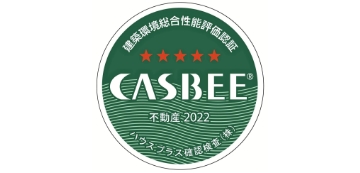
Environment measures of the Yomiuri Shimbun Building
Lights and air conditioning in offices are controlled by motion sensors to restrict energy use. After working hours, the lights are automatically turned off except in areas around the desks of people working overtime, and the air conditioning is adjusted for each floor zone while sensing the temperature.
In addition, in order to prevent a drastic increase in energy consumption during the hot days of summer, the night heat storage method is adopted so that coolant used in the air conditioners is manufactured during the night for use during the day at peak hours.
Solar panels are installed on the roofs, and the generated electricity is used i the building as part of efforts to make use of renewable energy.
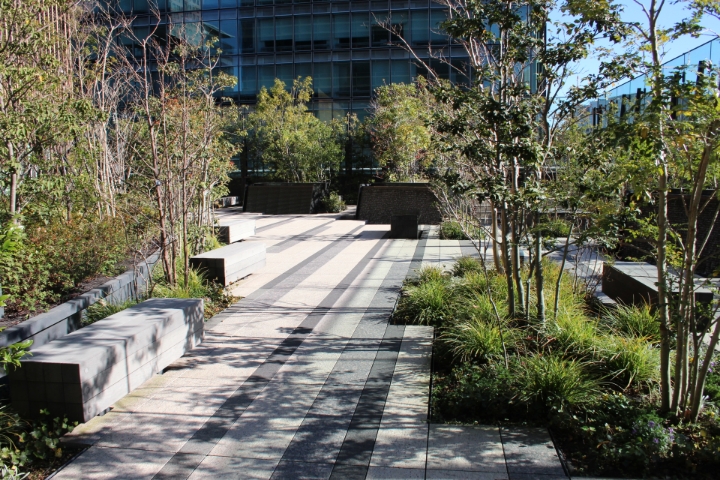
Transportation in Consideration to Environmental Impact Reduction
Beginning in June 2019, the Yomiuri Shimbun Holdings has collaborated with McDonald's Japan and conducted joint shipping, carrying food items used at McDonald's on our the trucks for transporting newspapers. This is intended to reduce environmental impact by increasing the transportation efficiency of both companies and reducing the number of trucks in operation.
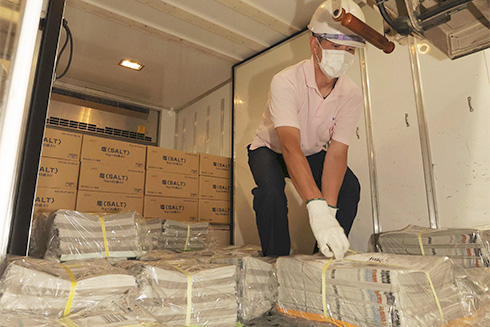
Solar Panels at Printing Plants
Solar power systems were introduced at Yomiuri Shimbun printing plants in August 2021 at the Gunma Plant (Fujioka, Gunma Prefecture) and in September 2023 at the Kiyosu Plant (Kiyosu, Aichi Prefecture). Solar power facilities installed on plant rooftops generate about 500 kilowatts and 200 kilowatts of electricity, respectively, and the power generated is used to print newspapers and for other purposes.
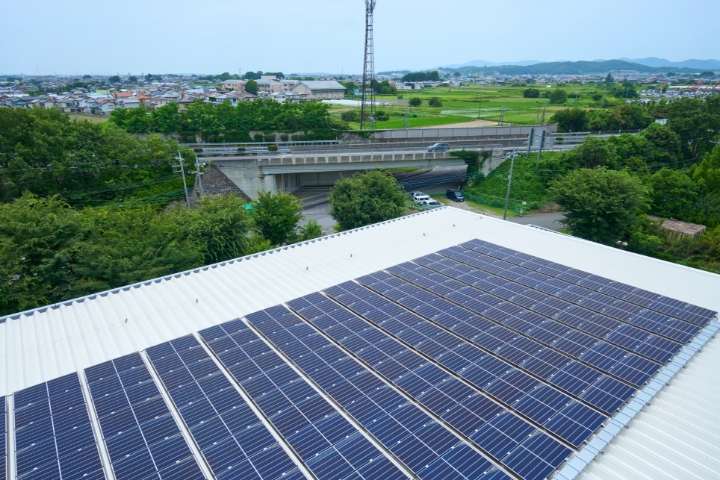
Promoting Decarbonization through the Media
As a media organization, The Yomiuri Shimbun delivers information necessary for decarbonization through newspaper and online. For example, we cover initiatives and measures related to decarbonization by the government, private-sector companies, schools and other organizations and report them daily.
Also, as a media organization, we have reported on the global environment from very early on. From 1989 to 1990 we ran a large serial feature on protecting the environment, and since then we have continued to run a variety of articles, highlighting problems and making recommendations through the media.
Carbon Neutral Project
Responding to climate change is getting more and more important each year. The Carbon Neutral Project has been established to deepen discussions on realizing a carbon-free society with the government, local governments, leading experts, corporations and members of the general public and to broadly convey to society the latest initiatives. The "Nippon no Mirai Forum (Japan future forum)," held in December 2022, was one of such occasions
